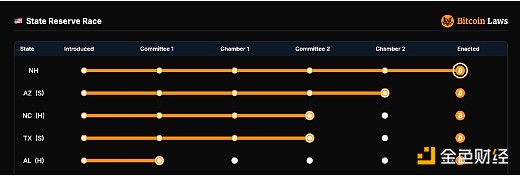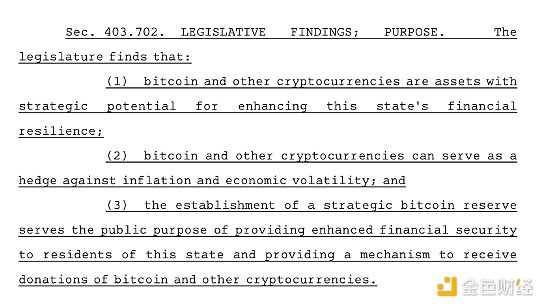Source: Blockworks; Compiled by Wuzhu, Golden Finance
Among the US states that are considering legislation to allow digital asset investments and/or the creation of reserves, New Hampshire has won the race.
How soon do we expect other states to follow suit?
As of yesterday, a bill to establish a "Digital Asset Strategic Reserve Fund" to be managed by the state treasurer has reached the desk of Arizona Governor Katie Hobbs.
But Hobbs may veto the bill, as she vetoed another bill last week that would have allowed state public funds to invest up to 10% in "virtual currency assets." She called these "untested investments."
So, if not Arizona, who will be next? According to the compiled documents, it could be North Carolina or Texas.

North Carolina’s Digital Asset Investment Act would authorize the state treasurer to invest 5% of any designated funds in “qualified digital assets.” The bill passed the second reading in the House of Representatives on April 30 with a vote of 71 to 44 and was sent to the Senate for consideration.
The bill would also “examine the feasibility of allowing members of state retirement income plans to make such investments (through cryptocurrency ETPs)” and study the establishment of a state reserve to hold seized or confiscated cryptocurrencies.
Texas’ proposed Strategic Bitcoin Reserve and Investment Act would establish a special fund to invest in cryptocurrency assets with a market value of $500 billion or more (currently limited to BTC).
Ishmael Green, a partner at the law firm Diaz Reus, said he expects about a half-dozen states to follow New Hampshire’s lead in the short to medium term — “as states seek to hedge against inflation in addition to protecting their balance sheets.”
Indeed, the text of the Texas bill reads as follows:

“In the long run, these types of laws will lead to upward price pressure and supply shortages as states and other institutional entities scramble to hoard more Bitcoin,” Green told me.
If these bills eventually pass, what will the governors of North Carolina and Texas think of cryptocurrencies? North Carolina Governor Josh Stein didn’t comment much but expressed support for the legislation.
“Texas is already the home of crypto mining. Texas should become the capital of crypto during this session,” Texas Governor Greg Abbott wrote in a November X post:
FalconX research director David Lawant said he also expects at least a few more states to enact such laws in the next six to 12 months.
But he’s keeping an eye on the Bitcoin Policy Institute’s framework (slated for release in June) that aims to help states craft effective BTC reserve laws.
“A common problem with many of the current proposals is that they’re not clearly worded or thoughtfully structured,” Lawant told me.
Suffice it to say, there’s a lot more to come.
 Kikyo
Kikyo




